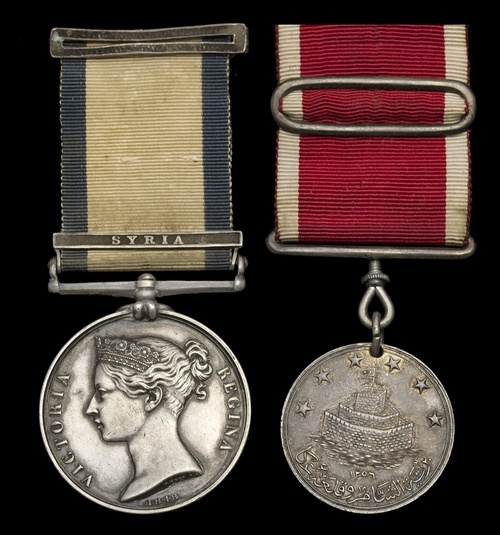
Auction: 24003 - Orders, Decorations and Medals
Lot: 81
The fascinating and perhaps unique campaign pair awarded to Mr. J. C. Brettell, a civilian mining engineer rescued by the Royal Navy before hostilities commenced; he was also responsible for producing the principal map of the fortress at St. Jean d'Acre used during the bombardment
Naval General Service 1793-1840, 1 clasp, Syria (Joseph C. Brettell.); St. Jean d'Acre, silver, mounted on contemporary silver ring and loop suspension (Joseph Cartwright Brettell - H.M.S. Benbow.), contemporarily named in upright capitals in the same style as the Naval General Service Medal, both upon silver pins for wear, good very fine (2)
Provenance:
Spink 1979.
Sotheby, March 1983.
Joseph Cartwright Brettell was born in 1801, the eldest of no less than 11 children of Thomas Bradley and Penelope Antrobus Brettell of Oldswinford, Stourbridge, West Midlands. Trained as a mining surveyor, the family were clearly of significant standing in the local community and beyond - indeed, at the age of only 29 Joseph was appointed Mayor of Dudley; there is still a 'Brettell Street' in the town to this day.
Perhaps seeking a bit of adventure and excitement, it appears that Brettell offered his services as a surveyor and engineer of mines to Muhammad Ali Pasha and it is highly likely he is the man referred to below: 'The country does not exceed 300 miles North to South, it features a range of mountains some upwards of 10,000 feet, the heights bear the cedars of Lebanon. Other parts are thick with vegetation, fossil plants are found above Deir-el-Khammar, coal exists in only one locality (as far as present exploration has gone) at Cornei. It was sought during the reign of Ibrahim Pacha's government of Syria by an enterprising British Engineer' (The Edinburgh Medical & Surgical Journal, Mr. Ebenezer Robertson's medical notes on Syria 1840-41, p.234-237 refers).
Though not a conflict directly affecting British possessions, during the Egyptian-Ottoman War of 1839-41 the Royal Navy acted to maintain the balance of power, and thus the Mediterranean Fleet (under the command of Admiral Sir Robert Stopford) found itself in action against Egyptian forces off the coast of Syria; one of the vessels in the British force was the 74-gun H.M.S. Benbow, and it is interesting to observe on the Admiralty medal roll (ADM 171/1) that Brettell is specifically noted as a 'Mining Engineer' and 'British Refugee' taken on board the ship at 'Beyrout' [sic] on 9 September 1840, only two days before open war broke out and Commodore Charles Napier ordered the bombardment of the city. It must have been a great relief to Brettell to be safe amongst his countrymen, and some further insight into this uncertain time can be observed from the diaries of William King Hall, at that time a junior officer aboard the Benbow:
'Tuesday, Sept. 8th 1840
10am, the Phoenix arrived with the mail from Malta, having touched at Alexandria on her way. The Admiral, with the Princess Charlotte - and Bellerophon - were under way for this place. Asia and Implacable at anchor off Alexandria, Cyclops is expected to sail for this place hourly....Here the prospect is all war; our Consul struck his flag and is on board H.M.S. Powerful, the English are nearly all off.'
Benbow, along with Carysfort and Zebra then sailed along the coast to Tortosa, a town 60 miles north; the plan was to land sailors and marines to capture the place and fortify it - however, due to faulty information from enemy deserters, the attack was far from unopposed and was called off after the British suffered casualties of five men killed and 17 wounded. Brettell must surely have further witnessed this abortive action and perhaps even lent a hand with the 'great guns' or a musket. Hall continues his account, with this excerpt immediately post-action: 'Upon getting to the Carysfort we sent the wounded in and with 4 dead shipmates below, who upon leaving the ship were in such good spirits not more than 3 hours before - we returned to the ship (Benbow). The men on board stopped to look and see who were hit when we came alongside - the nettings and ports of the main and lower deck and as well as the chains, were crowded with our shipmates - the Poop with the Officers - and when the grating was lowered in the boat to place the dead, "Poor Jass has gone" was uttered by the shipmate who had been with him for more than a year, with tears in his eyes in memory of a poor man but honest sailor he said, "God rest his soul in peace". The thing miscarried, but still the body of men behaved well under fire and the joy I feel at seeing my friends around me can scarcely be conceived."
The the Medal Roll states Brettell ceased to be aboard Benbow by 29 October, the well-known map of St. Jean d'Acre is dated 3 November and was drawn up 'from a rough sketch taken on the spot by Joseph C. Brettell, Mining Engineer' - this would suggest that he was further witness to the bombardment and capture of the citadel, and thus earned his medal. After the war, Brettell returned to Britain and settled in London - at some point he was appointed Secretary of the 'Royal Naval, Military, East India, and General Life Assurance Society' and married Sophia Store in 1853. However, he was not to enjoy his marriage for long as he died only three years later, at the age of 55, at 9 Park Walk, Chelsea.
Sold together with a bound booklet of comprehensive research and a copy of the Sotheby's auction catalogue from 3 March 1983.
Subject to 20% VAT on Buyer’s Premium. For more information please view Terms and Conditions for Buyers.
Sold for
£1,400
Starting price
£1400




